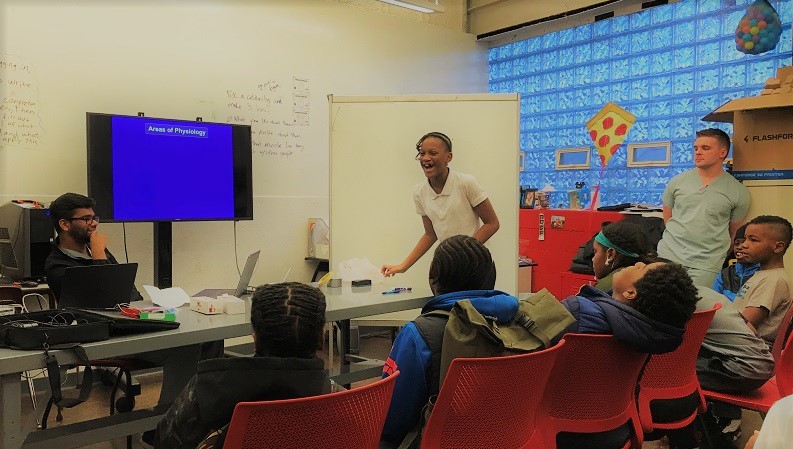
Downtown Boxing Gym Youth Program participants enjoyed learning about the physiology of the heart at a Nov. 20 session led by Wayne State University graduate student Shobi Mathew.
Shobi Mathew, a graduate student in the Wayne State University School of Medicine's Basic Medical Sciences master's degree program, last month launched medical education outreach programming within the Downtown Boxing Gym Youth Program to teach Detroit children about physiology and specific organ function.
The gym's youth program is a free, after-school academic and athletic program serving 150 high potential, low opportunity children between ages 8 and 18 who are interested in science, technology, engineering, arts and mathematics, Mathew said.
Located at 6445 E. Vernor Highway in Detroit, the gym is housed in a former bookbinding factory on Detroit's east side that includes an academic space, library, computer lab and classrooms.
Mathew has volunteered for the youth program since November 2017, tutoring and mentoring Detroit-area youth several times a week and leading a youth committee of older students to promote leadership skills.
In addition to his WSU studies, Mathew is a clinical research coordinator for the Department of Emergency of Medicine, where he manages a cardiac arrest database of Detroit.
The first session, held Nov. 20, highlighted the role of the heart. Mathew presented an interactive look at the heart's anatomy, defined and demonstrated blood pressure through a hands-on activity utilizing water blown through straws with different diameters, taught students how to understand automatic blood pressure cuff readings, helped them locate their pulse, explained how heart rate can change before and after exercise, and provided stethoscopes for students to listen to heartbeats.
"Feedback from the kids was amazing. They were sincerely engaged throughout the entirety of the session. The students participated in our demonstrations and asked questions during and after the session," Mathew said. "They were surprised when they learned the true structure of the heart rather than the animated version. We taught students how to check their heart rate and they pondered how it could change from rest to exercise and back to rest. In addition, students wanted to know more about the human body, which is why we are conducting more sessions."
The next session is scheduled for Jan. 28.
Mathew hopes to pursue a medical degree at WSU, and is mentored by department Professor and Associate Chair of Research Phillip Levy, M.D., M.P.H.
"I suggested the idea to Dr. Levy and he helped me to expand upon the idea. As my mentor, Dr. Levy has continually exemplified teaching expertise and provided the resources needed to successfully implement a program that exposes underserved Detroit students to the scientific and medical field," Mathew said.